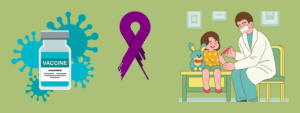Vaccines and dementia may seem unrelated, but emerging research reveals a surprising link between the two. Dementia is not a disease, but a syndrome of progressive symptoms, such as memory loss, confusion, changes in thinking and behavior, that disrupt normal daily life routine and caused by numerous brain conditions and diseases. Although it tends to increase with age, it’s not an ordinary aging process and it cannot be cured but treatment and support may help to control the symptoms. The most common forms of dementia are the Alzheimer disease, which is the most common, and the vascular dementia and the dementia with Lewy bodies.
Although we may say that there is no sure way of preventing dementia, you may Significantly lower your risk by Adhering to a healthy lifestyle that involves physical activity, a balanced diet, staying socially and mentally active, and cardiovascular health management.
Your other lifestyle habits such as preserving your hearing and vision, getting enough good sleep, quitting smoking and alcoholism, protecting your head, and treating chronic illnesses such as diabetes and blood pressure can also lower your risk.
Lifestyle and Diet:
- Eat a heart-healthy diet: Focus on a balanced diet rich in fruits, vegetables, whole grains, nuts, and fish, while limiting saturated fats, sugar, and processed foods.
- Exercise regularly: Exercise at least 30 minutes 5 or 6 days a week to keep the heart and brain healthy.
- Maintain a healthy weight: Being overweight or obese increases your risk of dementia, so even modest weight loss can help.
- Don’t smoke and limit alcohol: Quitting smoking and drinking alcohol in moderation can significantly lower your risk.
- Mental and Social Well-being: Stay mentally strong .
- Stay mentally active: Challenge your brain by doing something mentally stimulating like learning new skills, solving puzzles, or reading.
- Stay socially engaged: Maintain an active social life and connect with people, as this can help with stress, mood, and overall brain health.
- Get quality sleep: Address sleep issues like sleep apnea, as poor sleep linked to a higher dementia risk.
- Vaccination is not just a way to keep us safe against infections, but recent studies indicate that it can also help to decrease the risk of developing dementia. Our body develops resistance to diseases that can damage the brain when we get vaccines like flu, pneumonia, shingles or COVID-19.
Vaccines and dementia:
Prevention of infections that cause brain inflammation is one of the primary mechanisms of vaccines. Infection can result in brain swelling and stress and recurrent infections can lead to memory loss and Alzheimer disease. (Alzheimer disease is the most frequent type of dementia and can be a cause of 60 to 70% of cases). Dementia is now the seventh most frequent cause of mortality and one of the significant causes of disability and dependency in older adults around the world).

- Vaccines decrease the long-term harm to brain cells by averting these infections.
- Repeated inflammation in the body also reduced by vaccination. Prolonged inflammation is also a known cause of dementia, and thus, it is helpful to prevent brain damage by lowering it. Moreover, other vaccines boost the immune system to the extent that it becomes more efficient in clearing harmful proteins, such as beta-amyloid, which usually associated with Alzheimer.
- There are evident advantages in studies. Individuals that had frequent flu vaccinations were less prone to Alzheimer disease in Vaccines and dementia. Adults vaccinated against pneumonia or shingles also found to have lower risks of getting dementia. Indeed, the individuals who had several adult vaccinations were healthier and had better protection of their memory.
How Vaccination Helps Prevent Dementia:
- Protects the Brain from Infections
Diseases such as flu, pneumonia and shingles have the capacity to cause inflammation of the brain. Recurrent infections cause overstraining of brain cells and could result in memory impairments in the future. These infections are reduced by vaccines, and the brain is healthier.
- Reduces Chronic Inflammation
One of the causes of dementia is long-term inflammation of the body. Vaccines prevent infections and thus reduce this inflammation and protect the functioning of the brain.
- Strengthens the Immune System
Some vaccines “train” the immune system so it can better fight harmful proteins in the brain, such as beta-amyloid, which linked with Alzheimer’s disease.
- Supports Overall Health
With vaccination, individuals are not prone to serious diseases or repeated hospitalization. This will assist them to have a better heart and brain health, which reduce the risk of dementia.
| WAYS VACCINATION HELPS | HOW IT PREVENTS DEMENTIA |
| PREVENTS INFECTIONS | Stops illnesses (flu, pneumonia, shingles) that can cause brain inflammation and long-term damage. |
| REDUCE CHRONIC INFLAMMATION | Lowers continuous body and brain inflammation, which is a risk factor for dementia. |
| BOOSTS IMMUNE SYSTEM | Trains immunity to better fight harmful brain proteins like beta-amyloid linked to Alzheimer’s. |
| IMPROVE OVERALL HEALTH | Fewer hospital visits and healthier body lead to better brain protection over time. |

Several diseases that impair memory, thinking, and the capacity to carry out daily activities ,referred to as dementia.
The disease becomes progressive. It is primarily an older person disease but not everybody will develop it as the age.
Things that increase the risk of developing dementia include:
- age (more typical in individuals 65 years and older)
- high blood pressure (hypertension)
- high blood sugar (diabetes)
- being overweight or obese
- smoking
- drinking too much alcohol
- physically inactive
- socially isolated
- depression.
Treatment and care :
Vaccines and dementia are considered as one part .Although dementia cannot be cured, many treatments and support options can help individuals with the disease and their caregivers.
Individuals with dementia can do something to sustain their quality of life and support their well-being by:
- being physically active
- taking part in activities and social interactions that stimulate the brain and maintain daily function.
In addition, some medications can help manage dementia symptoms:
- Cholinesterase inhibitors such as donepezil usually used to manage Alzheimer disease.
- NMDA receptor antagonists such as memantine applied in severe Alzheimer disease and vascular dementia.
- Blood pressure and cholesterol medications can help avoid further destruction of the brain as a result of vascular dementia.
- Doctors may prescribe selective serotonin reuptake inhibitors (SSRIs) to treat severe depression in individuals with dementia when lifestyle and social changes fail to help, but they should not use them as the first line of treatment.
Individuals who have dementia and vaccinated tend to have fewer instances of recurrent diseases or prolonged hospitalization. Enhanced physical health is also closely related to enhanced mental health. Vaccination indirectly helps the heart and the brain by preventing serious health complications, which, in the long term, can lead to dementia.
Harmness:
In case patients with dementia are at risk of harming themselves or others, such medications as haloperidol and risperidone may be effective, although they should not be the initial treatment.
In Vaccines and dementia, Dementia disease not treated by vaccination but a great means of reducing the risk. Vaccines are also significant in preserving memory and mental capacity with age by preventing brain infections, chronic inflammation, boosting the immune system, and overall health.
- Vaccination does not only protect against infections but also the brain, reducing the chances of getting dementia later in life.
- Vaccines help preserve memory and thinking by preventing infections that can harm the brain.
- Vaccination is brain protection; a simple shot today will protect the mind tomorrow.
- Vaccines decrease inflammation of the body and this can also slow down the processes that cause dementia.
- Prevention by vaccination is not only about avoiding disease, it is about safeguarding our future intellectual health.
A good immunity today is a good memory tomorrow; the brain normally defended by vaccination.
Science demonstrates that vaccines are not only life-saving, but they can be mind-saving.
In simple words: Keeping on top of vaccines is not only about avoiding infection, but it can also be beneficial in terms of protecting our brain and lowering the chances of dementia later in life.
